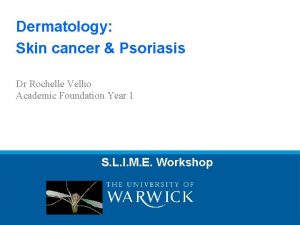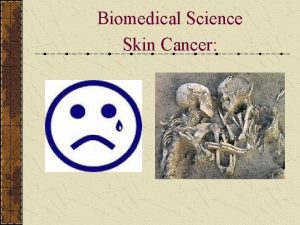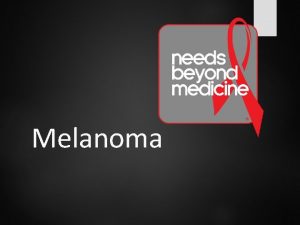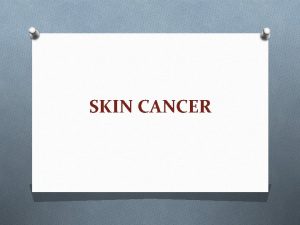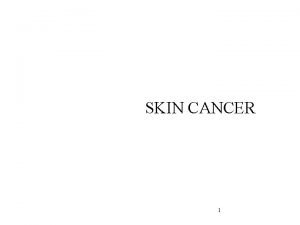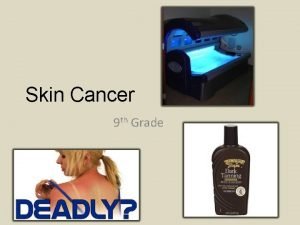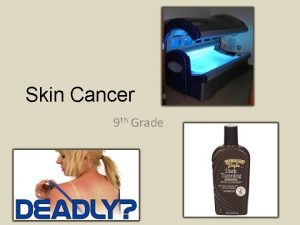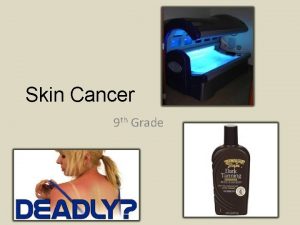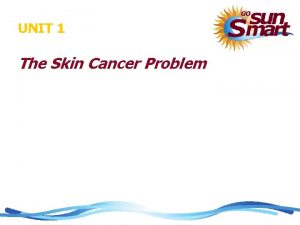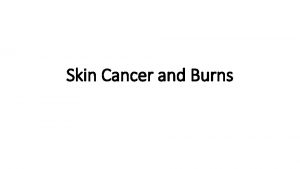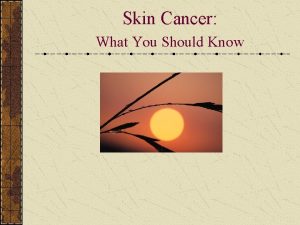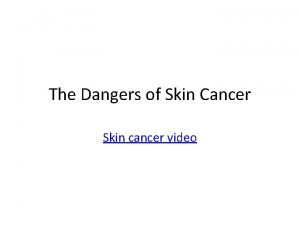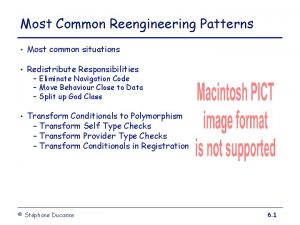Skin Cancer Skin cancer is the most common






































- Slides: 38

Skin Cancer Skin cancer is the most common type of cancer 2 out of 5 cancers are skin cancers

Skin Cancer · Cancer – uncontrolled cell growth · Caused by damage to the DNA (in the nucleus) usually through chemicals or radiation Slide 4. 29

Tumor Types · Two types of tumors · Benign · · Does not spread (encapsulated) Malignant: these are the cancerous ones · Metastasized (moves) to other parts of the body

Prevention n Ultraviolet Radiation is the main cause of all skin cancers

Skin Cancer Types · Basal cell carcinoma · Least malignant - Most common type · Arises from stratum basale · cannot produce keratin · Boundary lost between dermis and epidermis · 90% of skin cancers are basal cell · Seldom metastasizes – treated surgically or by radiation – 99% cure rate if caught early Slide 4. 30

Basal Cell Carcinoma

Basal Cell Carcinoma

Skin Cancer Types · Squamous cell carcinoma · 2 nd most common skin cancer – most common in darker skinned people · Arises from stratum spinosum · Metastasizes to lymph nodes if left untreated · 1500 -2000 deaths in US per year · Early removal allows a good chance of cure Copyright © 2003 Pearson Education, Inc. publishing as Benjamin Cummings Slide 4. 30

Squamous Cell Carcinoma

Cumulative Effects n n n IMPORTANT TO KNOW Basal cell & squamous cell carcinomas are due to cumulative effects of the sun’s radiation (or chemical exposures as well) These tend to develop in ages 30 -40 s after years of daily sun exposure

Skin Cancer Types · Malignant melanoma · Least common BUT most deadly of skin cancers · Originates melanocytes · Metastasizes rapidly to lymph and blood vessels · Early detection is critical – see notes for survival rates Copyright © 2003 Pearson Education, Inc. publishing as Benjamin Cummings Slide 4. 31

Intensive Effects n n n Malignant Melanoma tends to occur in younger ages (as well as older people) It is due to brief intense exposures (aka: sunburns) This is the most serious form of skin cancer and MUST be caught early to be treated successfully!

ABCD Rule · A = Asymmetry · Two sides of pigmented mole do not match · B = Border irregularity · Borders of mole are not smooth · C = Color · Different colors in pigmented area · D = Diameter · Spot is larger then 6 mm in diameter (pencil eraser) · Mole starts growing/changing in size Copyright © 2003 Pearson Education, Inc. publishing as Benjamin Cummings Slide 4. 32

Malignant Melanoma

Melanomas

Melanomas

Burns

Burns · Define: Protein denaturation and cell death caused by heat, electricity, UV radiation, or chemicals · 2 main dangers · Dehydration–Loss of fluids & Electrolytes lead to: ·Renal Shutdown ·Circulatory shock · Infection ·Skin (mechanical)barrier lost ·Immune system depresses Copyright © 2003 Pearson Education, Inc. publishing as Benjamin Cummings Slide 4. 25

Rule of nines diagram n Used to estimate the % extent of skin burned so doctors will know how much fluid to replace for rehydration to prevent n n n Circulatory shock Renal failure Need to memorize & be able to use

Partial Thickness Burns · First-degree burns · Only epidermis is damaged · Local redness, swelling, & pain · Usually heal in 2 -3 days (short time period) with NO scarring Copyright © 2003 Pearson Education, Inc. publishing as Benjamin Cummings Slide 4. 27

Partial Thickness Burns · Second degree burns · Epidermis and upper dermis & structures within dermis are damaged · Appearance of blisters of any size · Skin regeneration in 3 -4 weeks with some scarring · There is a danger of infection Copyright © 2003 Pearson Education, Inc. publishing as Benjamin Cummings Slide 4. 27





Full Thickness Burns · Third-degree burns · Epidermis, Dermis and all structures within are completely destroyed · Usually painless at site of burn due to destruction of sense recept · Burn is gray-white, tan, brown, black, or deep cherry red · Surrounded by areas of 1 st & 2 nd degree burns that will be painful · Treatments are numerous but will involve skin grafting of some sort, fluid replacement and debridement – may take months/years Slide Copyright © 2003 Pearson Education, Inc. publishing as Benjamin Cummings 4. 27






All degrees of burns

n 'Burns surgery for Sum Maya' hi-res | International Nepal Fellowship

Other Integumentary System disorders May help with WS

Athlete’s Foot

Boils Cold Sores

Skin Homeostatic Imbalances · Infections and allergies · Contact dermatitis · Exposures cause allergic reaction · Impetigo · Caused by bacterial infection · Psoriasis · Cause is unknown · Triggered by trauma, infection, stress Copyright © 2003 Pearson Education, Inc. publishing as Benjamin Cummings Slide 4. 24

Impetigo Psoriasis
 Abcd of skin cancer
Abcd of skin cancer Bad moles on skin
Bad moles on skin Skin cancer
Skin cancer Thick or thin skin
Thick or thin skin Thin skin vs thick skin
Thin skin vs thick skin Facial steps milady
Facial steps milady What is the greatest common factor of 18, 36, and 90?
What is the greatest common factor of 18, 36, and 90? Common anode and common cathode
Common anode and common cathode Common factors and common multiples
Common factors and common multiples How to find lowest common factor
How to find lowest common factor Common factors of 12 and 42
Common factors of 12 and 42 Multiples of 9 and 21
Multiples of 9 and 21 Hình ảnh bộ gõ cơ thể búng tay
Hình ảnh bộ gõ cơ thể búng tay Frameset trong html5
Frameset trong html5 Bổ thể
Bổ thể Tỉ lệ cơ thể trẻ em
Tỉ lệ cơ thể trẻ em Gấu đi như thế nào
Gấu đi như thế nào Thang điểm glasgow
Thang điểm glasgow Hát lên người ơi alleluia
Hát lên người ơi alleluia Các môn thể thao bắt đầu bằng từ đua
Các môn thể thao bắt đầu bằng từ đua Thế nào là hệ số cao nhất
Thế nào là hệ số cao nhất Các châu lục và đại dương trên thế giới
Các châu lục và đại dương trên thế giới Công thức tính thế năng
Công thức tính thế năng Trời xanh đây là của chúng ta thể thơ
Trời xanh đây là của chúng ta thể thơ Cách giải mật thư tọa độ
Cách giải mật thư tọa độ Phép trừ bù
Phép trừ bù độ dài liên kết
độ dài liên kết Các châu lục và đại dương trên thế giới
Các châu lục và đại dương trên thế giới Thơ thất ngôn tứ tuyệt đường luật
Thơ thất ngôn tứ tuyệt đường luật Quá trình desamine hóa có thể tạo ra
Quá trình desamine hóa có thể tạo ra Một số thể thơ truyền thống
Một số thể thơ truyền thống Bàn tay mà dây bẩn
Bàn tay mà dây bẩn Vẽ hình chiếu vuông góc của vật thể sau
Vẽ hình chiếu vuông góc của vật thể sau Thế nào là sự mỏi cơ
Thế nào là sự mỏi cơ đặc điểm cơ thể của người tối cổ
đặc điểm cơ thể của người tối cổ Ví dụ về giọng cùng tên
Ví dụ về giọng cùng tên Vẽ hình chiếu đứng bằng cạnh của vật thể
Vẽ hình chiếu đứng bằng cạnh của vật thể Vẽ hình chiếu vuông góc của vật thể sau
Vẽ hình chiếu vuông góc của vật thể sau Thẻ vin
Thẻ vin

